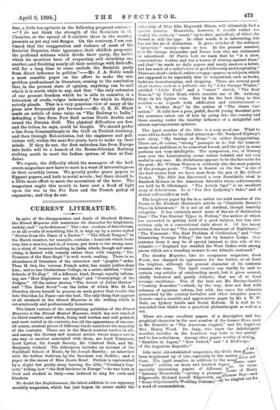No doubt the Englishwoman, the latest addition to our sixpenny
monthly magazines, which has just begun its career unaer the
editorship of Miss Ella Hepworth Dixon, will ultimately find a special mission. Meanwhile, however, it recalls rather too : °tidily the ordinary "smart," up-to-date periodical, of which the Strand is still the type. In other words, it is interesting, but has not the air of distinction. It gives articles of the ordinary " interview" variety—more or less. In the present number, it is Mr. George Alexander and Pierre Loti who are victimised or advertised. Of Pierre Loti we learn that he "is a slow, conscientious worker, and has a horror of writing against time," and that "he reads no daily papers and rarely answers a letter, but has much of a sailor's love of good fellowship and hospitality." There are short—indeed, rather scrappy—papers on subjects which are supposed to be especially dear to womankind, such as books, fashions, housekeeeping, and shopping. There are several good short stories, such as a pathetic one by "John Strange Winter," entitled "Little Fool," and a "smart" sketch, "The Real Reason," by Violet Hunt, which reminds one of Mr. Anthony Hope in his lighter vein. But by far the best thing in this number — as regards both edification and entertainment — is "A Boqdair Boy," by the author of "The Green Car- nation." It tells how a poor, pallid, flaccid young decadent gets the nonsense taken out of him by going into the country and there coming under the healthy influence of a delightful and almost septuagenarian spinster.






































 Previous page
Previous page